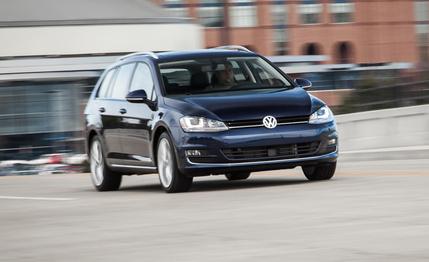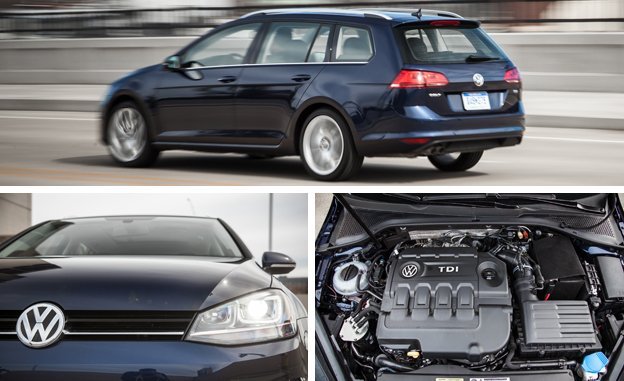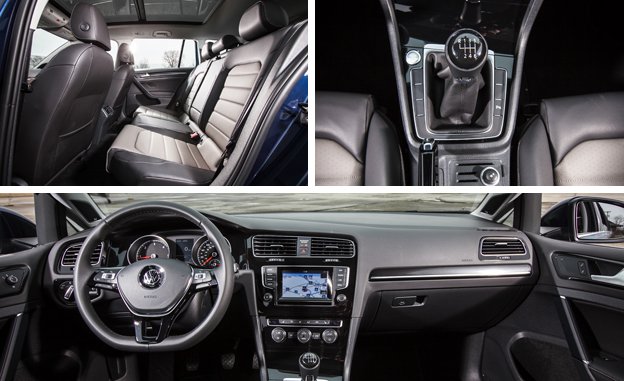 Instrumented Test
Instrumented Test
It really doesn’t matter which form of Volkswagen’s current-generation, 10Best-award-winning Golf compact you choose—you can’t go wrong with any of them. And so it goes with the 2015 Golf SportWagen TDI diesel tested here. It’s just a damn good car. Need a small family runabout with fun handling, outstanding build quality, and exceptional fuel economy? Grab yourself a diesel-powered Golf. Need slightly more cargo room? Snap up a diesel-powered SportWagen.
Sure, it sounds simplistic, but Volkswagen builds a Golf for practically everyone, from the humblest gas-powered two-door hatch to the GTI to the nearly $40,000, 292-hp, all-wheel-drive Golf R. The SportWagen TDI competes with nothing for that rare slice of the American car-buying public who wants a diesel-fed, stick-shift, compact wagon. We count ourselves among that legion, but a more mainstream experience is but $1100 and an extra clutch away, taking the form of an optional six-speed dual-clutch automatic transmission.

Being little more than a Golf with a longer roof and more cargo space, the SportWagen is just as pleasant to drive as its siblings. The structure is solid, the suspension deftly juggles bump absorption and body-control duties, and the electrically boosted steering is accurate and assuredly builds resistance in the driver’s hands as cornering forces increase. Occupants enjoy the same understated interior design, with the same upscale materials, supportive seats, and generous glass area.
With the diesel onboard, the TDI version replaces the gas-powered model’s zip with a more deliberate acceleration experience. The 2.0-liter diesel four is turbocharged, but as is common to such engines, it produces its peak torque down low (1750 rpm) and runs out of steam well before reaching its 5200-rpm fuel cutoff. At 8.4 seconds, the SportWagen TDI’s zero-to-60 run isn’t slow, but neither is it quick. What matters is that the little oil-burner is quiet, has more than enough muscle for downshift-free passes, and that it returned 38 mpg during its stay with us. The EPA rates the little wagon at 31 mpg in the city and 43 mpg on the highway, and our heavy right feet usually keep us from nearing the high end of the EPA’s range.
Compared with a Golf hatchback like our long-term Golf TSI, the SportWagen can fit an additional 7.6 cubic feet of stuff behind its rear seats; fold down those seatbacks, and the wagon’s edge grows to 13.8 cubic feet, for a total capacity of 66.5 cubes. That’s actually 2.5 cubic feet more volume than you’ll find in Volkswagen’s Touareg SUV with all of its seats folded, all neatly packaged into a useful rectilinear space. There are redundant seatback-release levers in the cargo hold that allow for folding the seats without opening a side door, and this being a compact wagon, the load floor is close to the ground.

While every version of the Golf SportWagen TDI is imbued with the sense of refinement and subtle luxury that defines the Golf lineup, customers can dial up different levels of standard equipment with the three available trim levels. The base S version starts at $25,415 and is surprisingly well equipped; go a little wild, and you can end up with the $30,000-plus SEL pictured here. Features such as dual-zone automatic climate control, touch-screen navigation, a panoramic sunroof, passive entry with push-button ignition, a Fender audio system, a backup camera, and heated seats are all included. Even fully loaded with the $995 Lighting (LED running lights, adaptive bixenon headlights) and the $695 Driver Assistance (parking sensors, forward-collision warning) packages, the total ask is just $32,855.
Avoid the options, or stick with a lesser trim, and you get the SportWagen’s do-it-all moxie for far less than the average cost of a new car in America. Want to save even more? Opt for the gas-powered SportWagen, which costs between $2100 and $3200 less than the TDI. As with the Golf lineup as a whole, no matter which SportWagen you choose, you’ll end up with an excellent car.